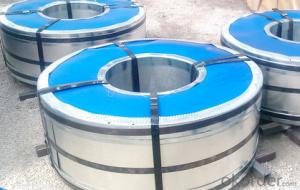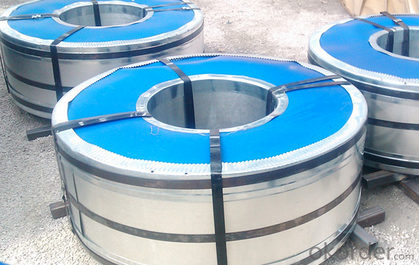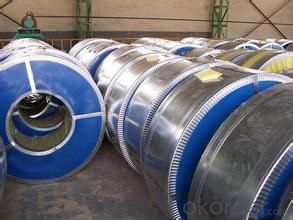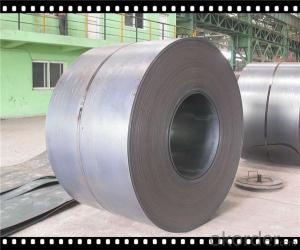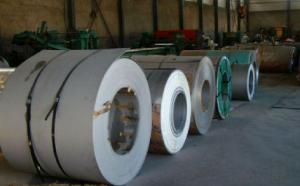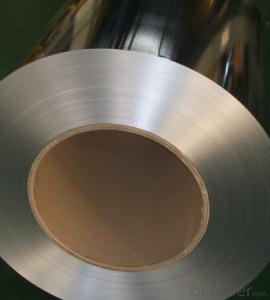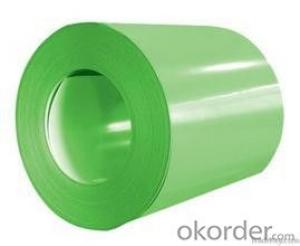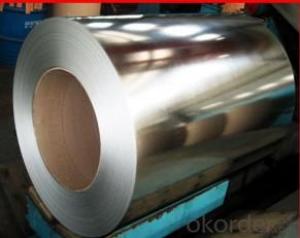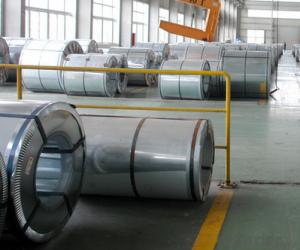Thickness: 0.15 - 2.0 mm
Technique: Hot Rolled
Application: Container Plate
Surface Treatment: Galvanized
Secondary Or Not: Non-secondary
Certification: CE
Special Pipe: Thick Wall Pipe
Alloy Or Not: Non-alloy
Section Shape: Other
Galvanized Steel Coil Dx51d Hot Dipped CNBM
- Loading Port:
- Guangzhou
- Payment Terms:
- TT OR LC
- Min Order Qty:
- 20 m.t.
- Supply Capability:
- 3000 m.t./month
OKorder Service Pledge
OKorder Financial Service
You Might Also Like
1.Quick Details:
2.Packaging & Delivery
| Packaging Details: | standard package |
|---|---|
| Delivery Detail: | 1-4 week |
cold rolled galvanizing steel coil
galvanized iron steel coil
Thickness | 0.15mm--2.0mm |
Width | 50--1250mm |
Zinc Coating | 40gsm—275gsm |
Spangle | Big, small regular spangle and zero spangle |
Surface Treatment | Chromate, Galvanized, Skin Pass, Passivity and Oiled(un-oiled) |
ID | 508mm or 610mm |
Coil Weight | 3--7 Metric Tons and as requirements |
Production | 12,000 metric tons per month |
More information of Galvanized Steel Coils/GI/PPGI/HDG | |
Payment Term | T/T or L/C (We usually charge 30% of the deposit first.) |
Delivery Port | Qingdao Port or Tianjin Port |
Delivery Time | Within 20 days after receipt of T/T or L/C |
MOQ | 25 metric tons or one 20 feet container |
Application | General use, Color coating, Corrugated Roofing making, Outside of the buildings Structure, Deep Drawing and etc. |
Ambition | Reliable product, Competitive price, On-time delivery and High standard service. |
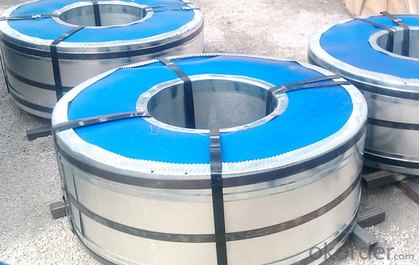
5.What is the application of Steel Coil?
There are two sides,one is out side: Workshop, agricultural warehouse, residential precast unit, corrugated roof, roller shutter door, rainwater drainage pipe, retailer booth;the other is inside: Door, doorcase, light steel roof structure, folding screen, elevator, stairway, vent gutter.
- Q: How are steel coils used in the production of metal fixtures?
- Steel coils are used in the production of metal fixtures as they are often the starting point for manufacturing processes. These coils are unwound and cut into specific lengths, which are then shaped, bent, and welded to create various metal fixtures such as shelves, brackets, and frames. The steel coils provide a consistent and high-quality raw material that can be easily formed and manipulated to meet the desired specifications of the fixtures being produced.
- Q: I'm not really sure if carbon steel is considered a metallic material.
- yes its iron with carbon in it
- Q: How are steel coils shipped internationally?
- Steel coils are shipped internationally using various methods to ensure their safe and efficient transportation. The most common method is through container shipping, where steel coils are loaded into standard shipping containers for transportation. These containers are specifically designed to handle heavy and bulky cargo, such as steel coils. To load the steel coils into the containers, they are usually stacked horizontally and secured with steel strapping or metal bands to prevent movement during transit. This ensures stability and minimizes the risk of damage. Additionally, wooden or metal dunnage may be used to separate and secure the coils to further prevent shifting. Once loaded, the containers are sealed and transported to the port using trucks or trains. At the port, the containers are loaded onto cargo ships, either by crane or using specialized equipment such as roll-on/roll-off (RO-RO) vessels or semi-submersible ships. These ships provide a secure environment for the steel coils during the journey, protecting them from weather conditions and potential damage. During the voyage, the steel coils are subjected to various safety measures to prevent corrosion and protect their integrity. These measures include applying protective coatings, such as oil or special paints, and using desiccants or humidity control systems inside the containers to regulate moisture levels and minimize the risk of rusting. Upon reaching the destination port, the containers are unloaded from the ship and transferred to trucks or trains for further transportation to their final destination. At this stage, the steel coils may undergo customs clearance and inspection procedures before being delivered to the intended recipients. Overall, international shipping of steel coils involves meticulous planning, secure packaging, and the use of specialized containers and equipment to ensure their safe and successful transport.
- Q: What are the different methods of steel coil surface cleaning?
- Some of the different methods of steel coil surface cleaning include pickling, shot blasting, and chemical cleaning. Pickling involves immersing the steel coil in an acid solution to remove oxides and scales. Shot blasting uses high-speed particles to remove rust, scale, and paint from the surface. Chemical cleaning involves using specialty chemicals to dissolve contaminants and restore the steel coil's surface.
- Q: and what are the four main elements in STAINLESS steel? x
- Very high carbon steel (0.96 to 2.11%) is hard and not very ductile (difficult to mold or shape). It is also difficult to weld, but has the lowest melting point. As the carbon content is reduced, the steel becomes softer, more ductile and melts at a higher temperature. Stainless steel is an alloy of Iron, Carbon, Chromium. The fourth element would depend upon the grade of steel, but Nickel is probably the most common.
- Q: What are the common methods of testing the strength of steel coils?
- Steel coils can be tested for strength using various methods. Tensile testing is one such method, which involves applying tension to the coil until it breaks. This test provides information about the coil's ability to withstand force and its tensile strength. It also reveals details about its yield strength and elongation properties. Another common method is hardness testing, which determines the steel's resistance to indentation or scratching. Different techniques like Rockwell, Brinell, or Vickers tests are utilized to measure hardness. This test helps determine the steel's ability to resist wear or deformation. To evaluate the coil's ductility and flexibility, bend testing is performed. The coil is bent to a specific angle and checked for any signs of cracking or fracturing. Bend testing assesses the material's capacity to withstand bending or forming procedures without failure. Additional methods of testing include impact testing, where controlled impacts are applied to assess the coil's resistance to sudden loading conditions, and fatigue testing, which involves subjecting the coil to cyclic loading to determine its endurance limit and potential for failure under repeated stress. It is important to note that the specific testing methods used may vary depending on the intended application and industry standards. Non-destructive testing techniques, such as ultrasonic testing or magnetic particle inspection, can also be employed to detect internal defects or flaws in steel coils without causing any damage.
- Q: The length of a steel beam increases by 0.78 mm when its temperature is raised from 22 degrees C to 35 degrees C. What is the length of the beam at 22 degrees C (in meters)?I used: L = (0.78 mm)/[(9/5)(.00000645 F)(13)] = 5.17 meters but Mastering Physics said Not quite. Check through your calculations; you may have made a rounding error or used the wrong number of significant figures. I'm confused because this is how we learned this kind of problem in class, so if anybody knows what I did wrong, feel free to correct my errors! Thanks
- It seems you are trying to convert celsius to Fahrenheit, Why? There is no need. Delta L= alpha (initial length) (delta celcius) what you need is an alpha, it should be given in degrees celsius to the negative first (steel's alpha happens to be 0.000036 1/celsius). You also need the length of the beam at 35 degrees C. This answer (delta L) needs to be added (if heat is rising) or subtracted (if heat is dropping) to the original length.
- Q: What are the common methods of transporting steel coils?
- There are several common methods of transporting steel coils, depending on the distance, quantity, and specific requirements of the shipment. The most commonly used methods include: 1. Flatbed trucks: This is the most basic and widely used method for short-distance transportation of steel coils. Flatbed trucks have a flat, open trailer bed that allows for easy loading and unloading of the coils. The coils are secured and strapped down to prevent movement during transit. 2. Rail transport: For longer distances, rail transport is often preferred due to its cost-effectiveness and efficiency. Coils are loaded onto specially designed railcars, known as coil cars or gondola cars, which have curved troughs or cradles to hold the coils securely in place. This method is particularly advantageous for large quantities of steel coils. 3. Ocean freight: When transporting steel coils internationally or over long distances across oceans, shipping by sea is a common method. The coils are typically loaded into specialized shipping containers, known as coil containers or coiled steel containers, which have internal cradles to prevent movement and damage during transit. These containers are then loaded onto cargo ships for transportation. 4. Barge transport: In regions with navigable waterways, barges can be used to transport steel coils. Similar to ocean freight, the coils are loaded into specially designed containers or barges with cradles to secure them during transport. Barges offer an economical and environmentally friendly option, especially for inland waterway transportation. 5. Intermodal transport: In some cases, a combination of different modes of transportation may be used for transporting steel coils. This is referred to as intermodal transport. For example, steel coils may be initially transported by truck to a rail yard, where they are then loaded onto railcars for long-distance transport. This method allows for the advantages of different modes of transportation to be combined, optimizing cost and efficiency. It is worth noting that the specific method of transporting steel coils may vary depending on factors such as coil size, weight, destination, and any specific handling requirements.
- Q: What is the use for spring steel that take advantage of its unique properties?
- This Site Might Help You. RE: Use for spring steel? What is the use for spring steel that take advantage of its unique properties?
- Q: I have been wanting a new pair of hiking boots, but haven't had the money. I just got a job that requires me to have steel toed boots. The job is only for a few weeks, but I may be required to wear them on other jobs in the future. Regardless of which style I get, I will most likely be buying Red Wing boots. On their website, I see they have steel toed hiking boots. What is the purpose of a steel toed hiking boot? Why would a hiker need to have steel toed boots? Wouldn't that just be more weight? I see that some of their hiking boots have aluminum toes, claiming to be 33% lighter than steel with the same protection. Would these boots be good potential hiking boots as well as suitable for construction or should I just focus on work boots and buy myself some hiking boots at a later date?
- Steel toed boots is a safety factor thing. Wilderness workers ie lumber jacks need safety shoes as well. But for long distance hiking steel toed shoes would be impractical due to the weight and wear and tare on The trails and your body. Get the boots you need for work, get the hiking boots you want after the next paycheck.
Send your message to us
Galvanized Steel Coil Dx51d Hot Dipped CNBM
- Loading Port:
- Guangzhou
- Payment Terms:
- TT OR LC
- Min Order Qty:
- 20 m.t.
- Supply Capability:
- 3000 m.t./month
OKorder Service Pledge
OKorder Financial Service
Similar products
Hot products
Hot Searches
Related keywords
